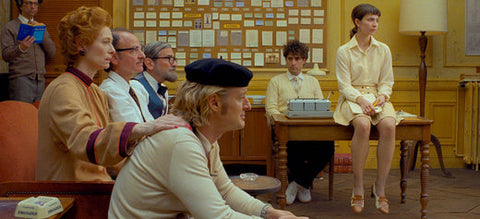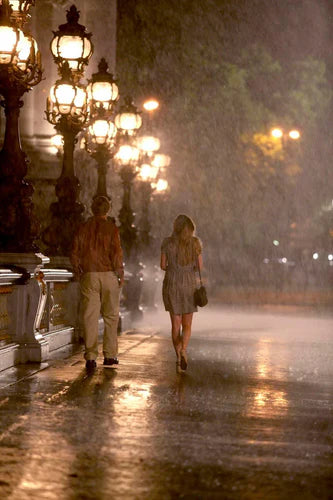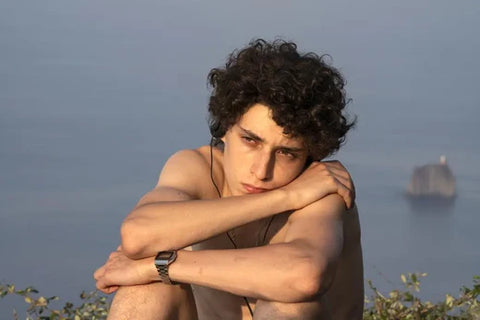
It’s not often the UK gets films ahead of Hong Kong or Taiwan, but The French Dispatch was a welcome exception. Seeing it on Barbican’s big screen, just three days after its premiere, was a small but deeply satisfying Sunday treat.
From start to finish, this film is pure storytelling magic. It begins with the death of the editor-in-chief of a Sunday paper in a quiet French town and unfolds into three whimsical, bizarre, and utterly captivating tales—touching on art, freedom, food, and, of course, love.
Wes Anderson’s signature aesthetics—those meticulous compositions and pastel palettes—are as much a character as the cast. But this time, he adds a tactile depth: the interplay between black and white and colour, the texture of paper woven into the visuals, the editorial boards with neatly pinned article progressions, scribbled-on manuscripts, the clatter of typewriters, and whimsical illustrations.
A Childhood Dream, and a Missed Opportunity
When I was younger, I wanted nothing more than to be a journalist. For my university interview, I even prepared a portfolio of articles about Hong Kong’s lesser-known stories. In hindsight, it was a naive, amateurish attempt—and the professor didn’t bother hiding his disdain. He didn’t even open the portfolio before dismissing me. That dream of joining a communication programme vanished in an instant.
Still, I got a shot at a newsroom gig before graduating. But family responsibilities meant I had to turn it down. From then on, my admiration for journalists only grew. They’re not just talented and driven—they pursue their passion on salaries that often don’t match their skills or sacrifices.
Even when I moved on to content creation for various companies, I found myself drawn to journalistic storytelling. Whether it was interviews with artists or digging into the stories behind local shops and cuisines, I loved uncovering and sharing those human moments. At one job, I even pitched a small in-house zine. The first issue went through countless revisions, my boss and I obsessing over every detail. It didn’t matter that most of our colleagues didn’t get it or care—it remains one of my happiest memories from that job.
The Joy of Chasing a Story
Watching The French Dispatch, I kept thinking about those moments. What makes this film so extraordinary isn’t that it tells us how the previous generation approached journalism—it’s that it captures the sheer joy of chasing a story. The three vignettes are wildly different, seemingly unconnected, and spiral toward chaos. Yet, just when it feels like the narrative might derail, Anderson lands each story with precision and grace, leaving a lingering resonance that’s hard to shake.
Although the setting is a fictional French town, Anderson’s true inspiration was The New Yorker. The legendary magazine, which also debuted in 1925, blends journalism, fiction, cartoons, food, and politics with unparalleled wit. Like The French Dispatch, it thrives on the talent of its writers and editors, who find beauty and humanity in the smallest of stories. They don’t just follow trends—they set them. (Incidentally, The New Yorker was the first Western publication to feature Haruki Murakami’s work, a fact Murakami remains grateful for to this day.)
A Farewell to Print
As the editor’s death brings this quirky, layered tale to a close, I couldn’t help but feel a pang of sadness. On the wall of his office hangs a sign: “No Crying.” Yet, I thought of all the print newspapers that have disappeared over the years, of journalists bidding farewell in the rain with the final edition in hand. I thought of childhood mornings at dim sum restaurants, my parents leafing through the day’s paper while I had my own little Children’s Weekly.
The memories kept flooding back. For all its whimsy, The French Dispatch felt like a poignant reminder of the things we’ve lost, and continue to lose. And in the end, how can you not cry?
A Final Note
Lately, I’ve been wondering what it really means to create “content.” Mainstream media and magazines are obsessed with speed, churning out recycled stories that are old news within hours. Even fashion magazines I once respected now read like glorified content farms. There’s no depth, no substance, just an endless stream of nothingness masquerading as something.
Perhaps that’s why The French Dispatch feels so vital. It’s a love letter to storytelling—not just the act of telling stories, but the passion, care, and humanity that go into creating something meaningful. And in a world that’s increasingly losing sight of that, it’s a reminder we desperately need.


